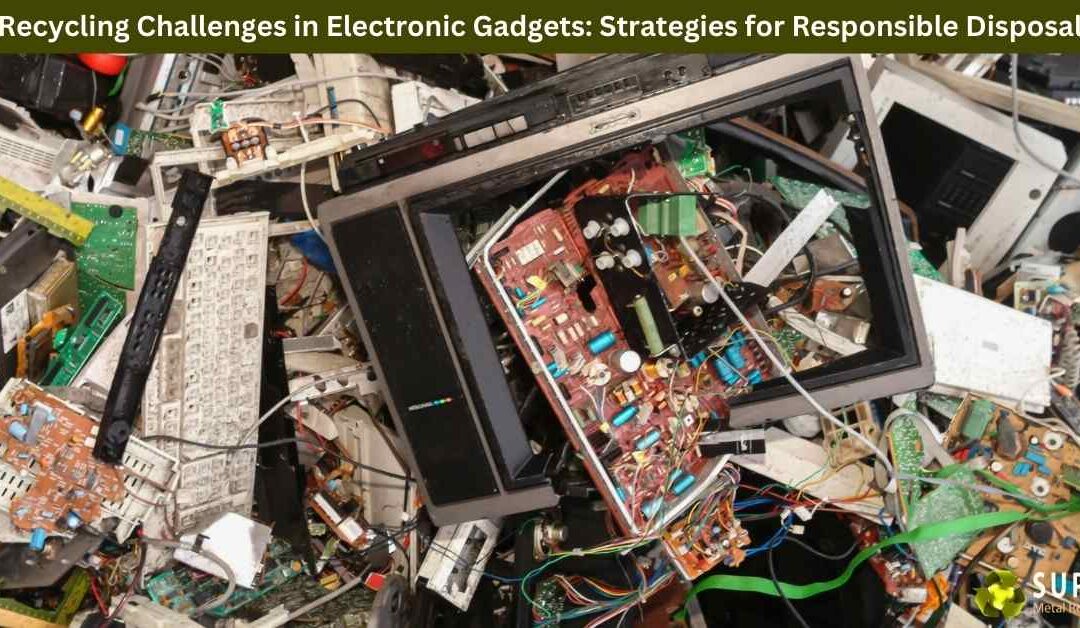The rapid advancement of technology has led to a surge in electronic gadgets, from smartphones to laptops, all of which have a limited lifespan. As these devices reach the end of their use, improper disposal poses significant environmental and health risks. Recycling electronic waste (e-waste) responsibly is essential, yet it comes with its own set of challenges. This article explores these challenges and offers strategies for ensuring responsible disposal.
The Growing Problem of E-Waste
Electronic gadgets contain a mix of valuable materials such as gold, silver, and copper, alongside hazardous substances like lead, mercury, and cadmium. When disposed of improperly, these devices contribute to:
- Environmental Pollution:
- Toxic chemicals can leach into soil and water, harming ecosystems.
- Health Risks:
- Exposure to hazardous materials affects human health, leading to respiratory, neurological, and developmental issues.
- Resource Wastage:
- Valuable metals are lost when devices are discarded rather than recycled.
Key Challenges in Recycling Electronic Gadgets
Despite the importance of e-waste recycling, several obstacles make it a complex task:
- Complex Material Composition:
- Electronic devices are made of multiple materials, often tightly integrated, making disassembly and separation difficult.
- Lack of Infrastructure:
- Many regions lack proper facilities for collecting and processing e-waste, leading to informal and unsafe recycling practices.
- Low Consumer Awareness:
- Many consumers are unaware of the environmental impact of improper disposal or the availability of recycling programs.
- Cost of Recycling:
- The high cost of recovering valuable materials often makes recycling less economically viable compared to mining virgin resources.
- Data Security Concerns:
- Fear of data breaches prevents individuals and businesses from recycling old electronic devices.
Strategies for Responsible E-Waste Disposal
To address these challenges, stakeholders must adopt a multi-faceted approach:
- Enhance Consumer Awareness:
- Educational campaigns can inform the public about the importance of recycling and available e-waste disposal options.
- Develop Advanced Recycling Technologies:
- Innovations such as robotic disassembly and chemical extraction can improve the efficiency and cost-effectiveness of e-waste recycling.
- Implement Take-Back Programs:
- Manufacturers and retailers can offer take-back schemes to encourage consumers to return old devices for proper recycling.
- Strengthen Regulations:
- Governments can enforce strict e-waste management laws and incentivize sustainable practices.
- Ensure Data Security:
- Providing secure data wiping services can alleviate concerns about privacy, encouraging more people to recycle their devices.
Successful E-Waste Recycling Initiatives
Several initiatives around the world showcase effective strategies for tackling e-waste:
- Australia’s National Television and Computer Recycling Scheme (NTCRS):
- This program provides free e-waste recycling for households and businesses, ensuring responsible disposal.
- The European Union’s WEEE Directive:
- The directive mandates collection and recycling targets for e-waste, promoting sustainable practices.
- Corporate Recycling Programs:
- Companies like Apple and Samsung have implemented trade-in and recycling programs, ensuring old devices are responsibly processed.
The Role of Individuals in E-Waste Recycling
Consumers play a crucial role in addressing the e-waste problem. Simple steps include:
- Donating functional devices to those in need.
- Using certified e-waste recycling facilities.
- Participating in manufacturer take-back programs.
- Extending the lifespan of gadgets through repairs and upgrades.
Conclusion
Recycling electronic gadgets responsibly is essential to mitigate environmental and health risks while conserving valuable resources. By addressing the challenges of e-waste recycling through technological advancements, regulatory frameworks, and increased consumer awareness, we can pave the way for a sustainable future. Every stakeholder—from governments and corporations to individuals—must contribute to this effort, ensuring that electronic waste is managed responsibly and efficiently.
If you are in Burwood, Victoria 3125, and looking for a metal recycling service, this is the best way to visit us.
345 Frankston – Dandenong Road, Dandenong South VIC 3175
(03) 9706 4909


Recent Comments